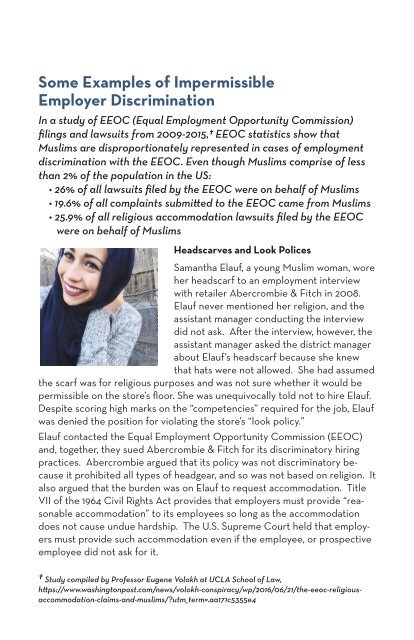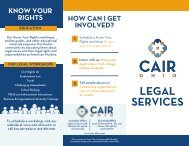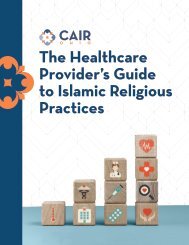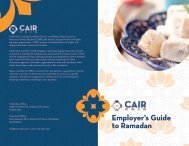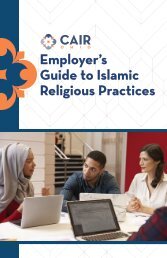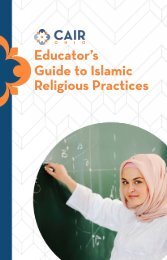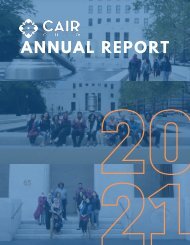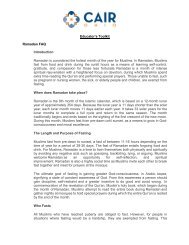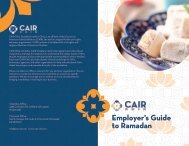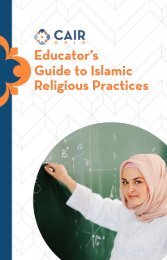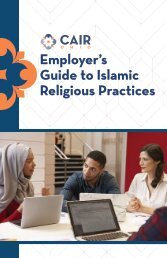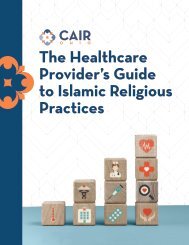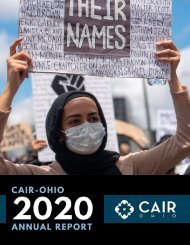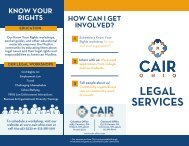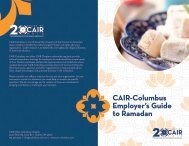CAIR-Ohio Employer's Guide to Islamic Religious Practices
This is a guide for employers that explains some basic Islamic religious practices including dress guidelines, holidays, prayer timing, and fasting, along with some suggested accommodations for employees.
This is a guide for employers that explains some basic Islamic religious practices including dress guidelines, holidays, prayer timing, and fasting, along with some suggested accommodations for employees.
Create successful ePaper yourself
Turn your PDF publications into a flip-book with our unique Google optimized e-Paper software.
Some Examples of Impermissible<br />
Employer Discrimination<br />
In a study of EEOC (Equal Employment Opportunity Commission)<br />
filings and lawsuits from 2009-2015,† EEOC statistics show that<br />
Muslims are disproportionately represented in cases of employment<br />
discrimination with the EEOC. Even though Muslims comprise of less<br />
than 2% of the population in the US:<br />
• 26% of all lawsuits filed by the EEOC were on behalf of Muslims<br />
• 19.6% of all complaints submitted <strong>to</strong> the EEOC came from Muslims<br />
• 25.9% of all religious accommodation lawsuits filed by the EEOC<br />
were on behalf of Muslims<br />
Headscarves and Look Polices<br />
Samantha Elauf, a young Muslim woman, wore<br />
her headscarf <strong>to</strong> an employment interview<br />
with retailer Abercrombie & Fitch in 2008.<br />
Elauf never mentioned her religion, and the<br />
assistant manager conducting the interview<br />
did not ask. After the interview, however, the<br />
assistant manager asked the district manager<br />
about Elauf’s headscarf because she knew<br />
that hats were not allowed. She had assumed<br />
the scarf was for religious purposes and was not sure whether it would be<br />
permissible on the s<strong>to</strong>re’s floor. She was unequivocally <strong>to</strong>ld not <strong>to</strong> hire Elauf.<br />
Despite scoring high marks on the “competencies” required for the job, Elauf<br />
was denied the position for violating the s<strong>to</strong>re’s “look policy.”<br />
Elauf contacted the Equal Employment Opportunity Commission (EEOC)<br />
and, <strong>to</strong>gether, they sued Abercrombie & Fitch for its discrimina<strong>to</strong>ry hiring<br />
practices. Abercrombie argued that its policy was not discrimina<strong>to</strong>ry because<br />
it prohibited all types of headgear, and so was not based on religion. It<br />
also argued that the burden was on Elauf <strong>to</strong> request accommodation. Title<br />
VII of the 1964 Civil Rights Act provides that employers must provide “reasonable<br />
accommodation” <strong>to</strong> its employees so long as the accommodation<br />
does not cause undue hardship. The U.S. Supreme Court held that employers<br />
must provide such accommodation even if the employee, or prospective<br />
employee did not ask for it.<br />
† Study compiled by Professor Eugene Volokh at UCLA School of Law,<br />
https://www.washing<strong>to</strong>npost.com/news/volokh-conspiracy/wp/2016/06/21/the-eeoc-religiousaccommodation-claims-and-muslims/?utm_term=.aa171c5355e4


